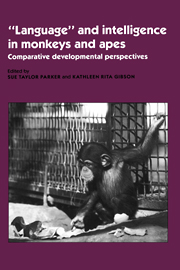Book contents
- Frontmatter
- Contents
- List of contributors
- Foreword
- Preface
- Acknowledgments
- Part I Theoretical frameworks for comparative developmental studies
- 1 Origins of comparative developmental evolutionary studies of primate mental abilities
- 2 How scientific usages reflect implicit theories: Adaptation, development, instinct, learning, cognition, and intelligence
- 3 New perspectives on instincts and intelligence: Brain size and the emergence of hierarchical mental constructional skills
- 4 Why big brains are so rare: Energy costs of intelligence and brain size in anthropoid primates
- Part II Comparative developmental perspectives on cebus intelligence
- Part III Questions regarding imitation, “language,” and cultural transmission in apes and monkeys
- Part IV Developmental perspectives on social intelligence and communication in great apes
- Part V Development of numerical and classificatory abilities in chimpanzees and other vertebrates
- Part VI Comparative developmental perspectives on ape “language”
- Index
2 - How scientific usages reflect implicit theories: Adaptation, development, instinct, learning, cognition, and intelligence
Published online by Cambridge University Press: 11 May 2010
- Frontmatter
- Contents
- List of contributors
- Foreword
- Preface
- Acknowledgments
- Part I Theoretical frameworks for comparative developmental studies
- 1 Origins of comparative developmental evolutionary studies of primate mental abilities
- 2 How scientific usages reflect implicit theories: Adaptation, development, instinct, learning, cognition, and intelligence
- 3 New perspectives on instincts and intelligence: Brain size and the emergence of hierarchical mental constructional skills
- 4 Why big brains are so rare: Energy costs of intelligence and brain size in anthropoid primates
- Part II Comparative developmental perspectives on cebus intelligence
- Part III Questions regarding imitation, “language,” and cultural transmission in apes and monkeys
- Part IV Developmental perspectives on social intelligence and communication in great apes
- Part V Development of numerical and classificatory abilities in chimpanzees and other vertebrates
- Part VI Comparative developmental perspectives on ape “language”
- Index
Summary
As the anthropological linguist Edward Sapir noted, language is largely unconscious. In everyday life, we all use words without knowing exactly what we mean by them. Examination of scholarly works suggests that we extend this practice into our professional lives as well. The words we use and the way we use them reflect our implicit, unconscious knowledge, presuppositions, and theories (and, equally, our implicit, unconscious ignorance). The nature of one's implicit knowledge (and ignorance) is determined by one's disciplinary training and one's personal intellectual history.
Specialists in philosophy, zoology (especially ethology), cognitive sciences, and various branches of psychology, for example, often use the terms learning, intelligence, and cognition in subtly different ways. Scholars in different subdisciplines describe similar phenomena in different terms: Comparative psychologists, especially learning and conditioning theorists, for example, use the term learning to describe the acquisition of instrumental behaviors, whereas comparative developmental psychologists use intelligence or cognition to describe such acquisitions. Through the years, various investigators have used a variety of terms to characterize animal abilities. A brief survey of books on mental abilities of animals, for example, reveals varying usages of the related terms mind/mentality, learning, cognition, intelligence, thought, and consciousness (Table 2.1).
Instinct, learning, intelligence, and development are used in different ways by embryologists, learning and conditioning theorists, ethologists, and developmental psychologists. Although William James and John B.
Information
- Type
- Chapter
- Information
- 'Language' and Intelligence in Monkeys and ApesComparative Developmental Perspectives, pp. 65 - 96Publisher: Cambridge University PressPrint publication year: 1990
Accessibility standard: Unknown
Why this information is here
This section outlines the accessibility features of this content - including support for screen readers, full keyboard navigation and high-contrast display options. This may not be relevant for you.Accessibility Information
- 1
- Cited by
